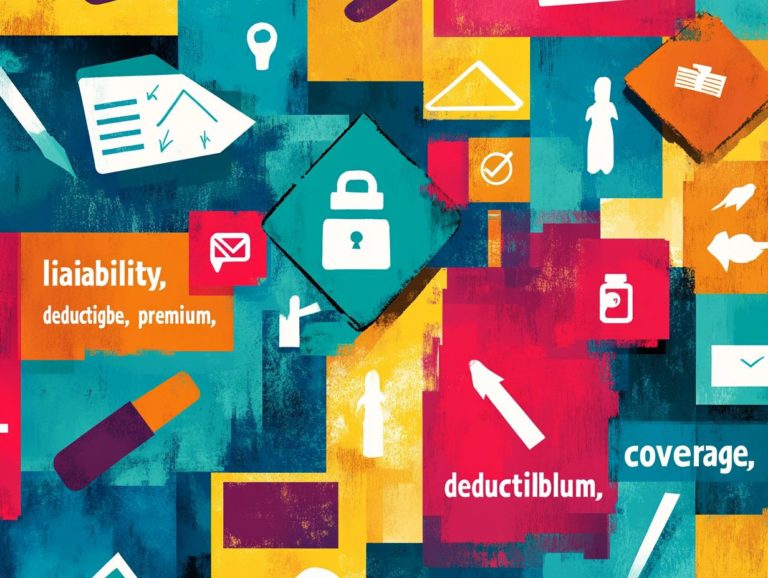How to Choose the Right Insurance as a Freelancer
Freelancing is thrilling, but it comes with risks you can’t ignore! Let s dive into how to protect yourself. Freelancing provides a remarkable blend of freedom and flexibility, yet it also presents distinct risks that necessitate a thoughtful approach to insurance needs.
Navigating the intricate landscape of health insurance can feel daunting. Evaluating specific risks and pinpointing coverage gaps is essential for freelancers.
This guide will illuminate the key types of insurance policies that every freelancer should contemplate. We will also cover crucial factors to weigh when selecting a policy and practical strategies for managing health insurance costs effectively.
By familiarizing yourself with your options, including group health insurance and individual plans, you can safeguard both your professional pursuits and your livelihood with confidence.
Contents
- Key Takeaways:
- Understanding Your Insurance Needs as a Freelancer and the Importance of freelance health insurance
- Types of Insurance for Freelancers
- Factors to Consider When Choosing Insurance
- How to Find and Compare Insurance Options
- Tips for Managing Insurance Costs as a Freelancer
- Frequently Asked Questions
- What are the most important types of insurance for freelancers to consider?
- How can I determine what type of insurance coverage I need as a freelancer?
- What factors should I consider when choosing an insurance provider?
- Is it necessary for me to have insurance as a freelancer?
- Can I purchase insurance as a freelancer even if I have pre-existing health conditions?
- How often should I review and update my insurance coverage as a freelancer?
Key Takeaways:

- Assess your risks and coverage gaps to determine your insurance needs as a freelancer.
- Evaluate coverage limits, costs, and provider reputation to make the best choice.
- Research and compare insurance options. Negotiate rates and deductibles, and utilize tax deductions to manage costs effectively as a freelancer.
Understanding Your Insurance Needs as a Freelancer and the Importance of freelance health insurance
As a freelancer navigating the modern gig economy, grasping your health insurance needs is paramount for securing financial stability and peace of mind.
You encounter unique challenges regarding self-employed health insurance, particularly since you don’t have the luxury of traditional employer-sponsored plans that many employees depend on.
It s vital to evaluate individual coverage options such as disability insurance, and manage out-of-pocket costs. Explore various insurance plans specifically designed for self-employed individuals.
The Affordable Care Act (ACA) marketplace presents a wealth of diverse health insurance plans. This allows you to access premium tax credits, health savings accounts, and other valuable resources such as wellness resources to customize your insurance coverage effectively.
Assessing Your Risks and Coverage Gaps
Assessing your risks and identifying coverage gaps is a crucial first step in selecting the right health insurance plan as a freelancer. This ensures you are well-protected against unexpected medical expenses.
By recognizing chronic medical conditions and understanding your personal health metrics, you can more accurately estimate potential health-related costs. This evaluation directly impacts the choice of insurance providers and plans that align best with your unique circumstances.
Understanding the intricacies of out-of-pocket costs, including deductibles, co-insurance (the percentage of costs you pay after your deductible), and copay, will enable you to navigate healthcare expenses more adeptly.
Collaborating closely with healthcare providers, including flat-fee doctors, is essential. They can provide valuable insights into treatment options and recommend plans that deliver comprehensive health care coverage for both your immediate and long-term healthcare needs.
Types of Insurance for Freelancers
Act now to explore the essential insurance options that can protect your future! As a freelancer, it’s essential to consider various types of insurance options to safeguard your financial future against unforeseen circumstances.
The primary insurance types you should keep in mind include:
- Health insurance
- Liability insurance
- Disability insurance
- Life insurance
Each serves its own distinct purpose, including business group plans that can often provide more favorable rates.
Health insurance is crucial for managing medical expenses. It ensures that you won t be left scrambling in case of unexpected health issues.
Liability insurance acts as your safety net against claims stemming from your professional activities, protecting your hard-earned reputation and offering legal protection in case of negligence or malpractice.
Disability insurance delivers financial support should you face unforeseen health challenges, while life insurance secures your family s financial well-being in the event of an untimely passing.
Understanding these diverse insurance policies is vital for you as a freelancer looking to establish stability in your work environment.
Health Insurance
Health insurance serves as the foundation of your financial security as a freelancer. It enables you to access essential healthcare services without facing high medical costs.
For independent workers like yourself, understanding the range of health insurance options available is vital for maintaining your overall well-being. Individual plans can often be tailored specifically to meet your needs. The ACA marketplace, a system where people can compare and buy health insurance, offers a comprehensive platform for exploring coverage that aligns with your unique lifestyle choices. Additionally, it’s important to be aware of the top insurance myths for freelancers to make informed decisions.
Preventive care is crucial; it can save you from expensive medical bills later, while prescription drug coverage guarantees access to the medications you need. Additionally, premium tax credits can significantly reduce your insurance costs, making it much more attainable.
Choosing the right healthcare provider is equally important. It should align with your personal health requirements and ensure that accessing medical services is a smooth and hassle-free experience. This is particularly important due to the complexities of health insurance costs. Additionally, freelancers should consider life insurance for added financial security.
Liability Insurance

Liability insurance serves as a crucial safety net for freelancers. It offers essential legal protection against claims of negligence or malpractice that may arise during your work. This makes it a must-have in the insurance industry.
Understanding the various types of liability insurance like professional liability insurance and general liability insurance is vital for anyone operating independently. Professional liability insurance specifically safeguards you against claims resulting from errors or omissions in your services.
The specifics can vary greatly depending on your industry; for instance, healthcare providers have distinct needs compared to graphic designers. This underscores the importance of tailored coverage options and engaging with insurance agents to find the right fit, including exploring the top 5 insurance plans for freelancers.
General liability insurance, on the other hand, covers a broader spectrum of risks, including bodily injury or property damage related to your business activities. Professional organizations frequently play a pivotal role in helping freelancers access these essential policies, providing resources and guidance to find the perfect fit for your unique requirements. Additionally, how to save on insurance as a freelancer can be a valuable resource in navigating your options.
It’s also wise to consider the potential tax implications of liability insurance. Since premiums may be tax-deductible, you stand to gain a financial advantage while ensuring you have the necessary protection, especially when navigating COBRA coverage.
Disability Insurance
Disability insurance is essential for you as a freelancer. It provides income replacement in case a debilitating illness or injury prevents you from working. This ensures you can focus on recovery without added financial stress.
As a self-employed individual, understanding the different options available is crucial. You can choose between short-term and long-term disability coverage, each designed to meet your specific needs based on your unique circumstances and insurance experience. Additionally, it’s important to consider freelancer liability insurance to protect yourself in your freelance work.
- Short-term disability typically covers a limited period and offers cash payments shortly after a claim is made, which can be particularly beneficial for managing immediate expenses.
- In contrast, long-term policies can protect your financial stability for months or even years crucial for those whose livelihoods rely entirely on their ability to work.
With various coverage levels and flexible features, including options for spousal policies, disability insurance gives you peace of mind. Don’t wait until it’s too late secure your coverage now!
Life Insurance
Life insurance is essential for freelancers. It ensures financial security for your loved ones if something happens to you through options like term life insurance.
Freelancers must explore different coverage options. This includes important plans like COBRA and Medicaid, especially without employer benefits.
Among the various policies, term life insurance serves as a temporary safety net for a specified duration. It’s a cost-effective choice for those with fluctuating incomes who are considering insurance agents for guidance. Freelancers may also want to explore a freelancers’ guide to health insurance to better understand their options.
On the other hand, whole life insurance offers lifelong protection and includes a cash value component. This makes it appealing for freelancers who seek coverage along with investment opportunities. Exploring spousal policies can further enhance your family’s financial security. Consulting with insurance agents ensures all members are protected against unforeseen challenges, and understanding freelancer insurance options can provide additional insights into securing the right protection.
Factors to Consider When Choosing Insurance
When selecting insurance, various factors influence the quality and affordability of your coverage. It s crucial for freelancers to make informed decisions in this process, considering health insurance plans and group health insurance options.
Coverage Limits and Costs
Know your coverage limits and costs. Monthly premiums and maximum out-of-pocket limits directly impact your financial responsibility.
By navigating the intricate web of health insurance terminology, including understanding open enrollment periods, you can make informed decisions. A deductible is the amount you pay out-of-pocket before your insurance covers expenses. Then there’s co-insurance, which is the percentage of costs you re responsible for after meeting that deductible.
It s crucial to understand maximum out-of-pocket expenses, which can significantly affect your overall healthcare costs. This figure caps your total spending in a year, providing a layer of financial security. By grasping how these elements interact, you can make strategic choices that align your insurance coverage with your healthcare needs and potential costs.
Provider Reputation and Customer Service

Choose reputable insurance providers. Great customer service is key when selecting health insurance plans.
As you navigate through the myriad of options, dive into reviews and ratings from other consumers. Trustworthy feedback provides valuable insights into the effectiveness of coverage and responsiveness of customer service.
Engaging with an insurance agent can simplify this journey. They clarify the nuances of various plans and help you verify the provider’s reputation. A proactive customer service team can turn a potentially overwhelming experience into a seamless one. This greatly enhances your satisfaction, ensuring you feel valued and supported throughout your insurance journey.
How to Find and Compare Insurance Options
Finding the right insurance options can be overwhelming. With careful research, you can discover coverage that meets your unique needs.
Researching and Evaluating Plans
Researching and evaluating health insurance plans, especially those that might include group health insurance through professional organizations, is essential for freelancers like you. This process helps identify coverage options, including different plans like health savings accounts and high-deductible plans that suit your financial strategy and meet your unique needs and budget.
Diving into the world of health insurance may seem overwhelming at first. However, taking a systematic approach to understanding your insurance options as a freelancer can make the process much more manageable. Additionally, it’s important to know how to choose the right tax software as a freelancer to simplify your financial management.
Start by understanding the various coverage options available, whether you’re considering comprehensive plans or individual plans that may suit your needs or high-deductible policies. Once you’ve narrowed down a few suitable choices, comparing premiums, which can vary significantly between different insurance options becomes crucial to ensure affordability.
Utilizing online resources can be incredibly beneficial. You can read reviews, access comparison charts, and even consult forums to gather firsthand experiences. By weighing factors such as provider flexibility, the breadth of the healthcare network that includes coverage for preventive care and prescription drug coverage, and the specific benefits offered, you’ll be better equipped to make informed decisions that align with both your health requirements and financial situation.
Tips for Managing Insurance Costs as a Freelancer
Managing insurance costs, particularly out-of-pocket costs and monthly premiums is essential for freelancers who regularly navigate unpredictable incomes and fluctuating expenses.
Fortunately, there are effective strategies that freelancers can use to manage health insurance costs. For example, tax credits that can lower your monthly payments can alleviate some of these financial burdens.
Negotiating Rates and Deductibles
Negotiating rates and understanding deductibles can significantly reduce the overall costs tied to health insurance for freelancers, opening the door to more sustainable coverage options.
By exploring a variety of insurance providers and capitalizing on competitive rates, you position yourself to negotiate more effectively. Pursuing lower deductibles the amount you pay out of pocket before your insurance starts to help is another robust strategy that can lead to long-term savings in your out-of-pocket expenses.
Clear communication is paramount in these discussions. Make sure to clearly express your unique needs and any concerns regarding coverage. This level of transparency not only builds trust but also greatly increases your chances of securing favorable terms.
Additionally, considering bundled services or discounts can optimize your costs further, paving the way for a more financially manageable insurance plan.
Utilizing Tax Deductions

Utilizing tax deductions for self-employed individuals can help reduce your taxable income and effectively alleviate some of the financial pressure that comes with health insurance costs. This offers much-needed relief during challenging economic times.
These deductions enable you to manage your expenses more efficiently, allowing you to focus on what truly matters: growing your business while managing your health insurance and financial planning.
For instance, you can take advantage of premium tax credits, which can significantly lower your monthly insurance premiums, making healthcare far more accessible. Additionally, exploring the 10 essential insurance types for freelancers can help you find the right coverage tailored to your needs. The self-employed health insurance deduction allows you to deduct the cost of health insurance premiums from your taxable income, further easing your financial burdens.
By understanding these deductions, you not only reduce your taxable income but also play a critical role in your financial planning. This knowledge enables you to allocate resources more efficiently and strategically for future investments and personal needs.
Frequently Asked Questions
What are the most important types of insurance for freelancers to consider?
The most important types of insurance for freelancers to consider are health insurance, disability insurance to protect your income in case of an unforeseen situation, liability insurance, and professional liability insurance.
Act now to secure the best coverage options available for your needs!
How can I determine what type of insurance coverage I need as a freelancer?
Consider your job duties and potential risks. Your current financial situation also plays a key role in deciding the type and level of insurance coverage.
What factors should I consider when choosing an insurance provider?
When choosing an insurance provider, think about their reputation. Also, look at their coverage options, costs, and customer service.
Is it necessary for me to have insurance as a freelancer?
Insurance is not legally required for freelancers. However, having it is crucial to protect yourself and your business from financial losses.
Can I purchase insurance as a freelancer even if I have pre-existing health conditions?
Absolutely! You can still buy health insurance as a freelancer, even with pre-existing conditions. Check out options under the Affordable Care Act or find a private provider that offers coverage.
How often should I review and update my insurance coverage as a freelancer?
Review and update your insurance coverage at least once a year. Also, make changes when there are significant shifts in your job duties or finances.






